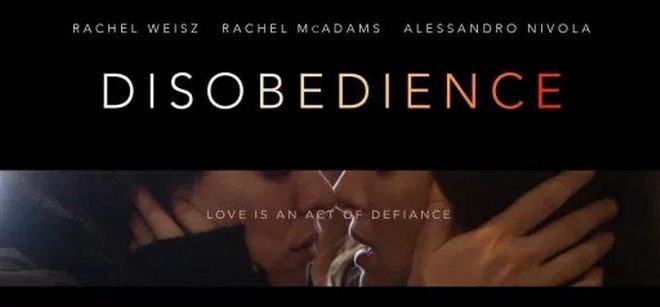
Movie Reviews
Disobedience
By: Jennifer Verzuh
We never quite get the full picture in Disobedience. Not really. We know a few things concretely, but most creep under the surface until they come boiling to the top. It takes a while to get explicit confirmation of anything and in many places we just have to fill in the gaps ourselves. I think it’d even be fair to say that much of the most interesting things in this story seem to have taken place before the movie we actually see begins. But as frustrating as it can be at times, that’s kind of the film’s magic too.
The film begins with the death of Rav Kruschka (Anton Lesser), a respected Rabbi in an Orthodox Jewish community in London. He’s a figure whose influence looms over all the characters, yet we only actually see him for a few minutes. After learning of his passing, his estranged daughter Ronit (Rachel Weisz, also acting as a producer here), a photographer in New York, returns to the area to attend his funeral. Her presence in the community raises eyebrows as she was unexpected and no longer fits the ideal of how a woman should look and behave. While there she reconnects with her cousin and close childhood friend Dovid (Alessandro Nivola), now a rabbi, and his wife Esti (our industry’s other most talented Rachel….McAdams) who is another friend whom she shared a romance with when they were younger.
We don’t witness Esti and Ronit’s courtship and how they fell in love in their youth. We don’t see the friendship between Esti, Ronit and Dovid as kids. And we aren’t privy to the beginnings of Dovid’s love and commitment to his faith either. Nor do we get to see Ronit ever interact with her father. But we get inklings of it all, both verbal and non-verbal, that are brilliantly just enough. The way Dovid stands up for Ronit when others question why she’s here and how Esti smiles and attempts to stifle her laughs when Ronit cracks jokes at a dinner with an important member in the community show how much they both care about her and hint at their pasts. These gaps give the viewer more to engage with and unravel and provide the actors so much more to play with, which they all do to great affect thanks to director Sebastián Lelio’s close and careful direction.
At a recent question and answer with the director Sebastián Lelio, a viewer asked him if he ever considered including flashbacks, particularly ones showing the origins of the film’s central romantic relationship: Ronit and Este. He said no, he didn’t like them. It’d be too easy to spell everything out. And you don’t need to see them kiss as girls beforehand to tell there’s a history there when we see them reunite in the kitchen. He’s right and it’s far more intriguing to uncover it this way. The looks between them, what’s spoken and what’s not, and their physicality all communicate their past connection – one that it appears has survived to the present as well. The same can be said of the film’s other relationships.
Lelio and his cinematographer Danny Cohen work together to create a bleak, stark environment with muted colors, mirroring the restrained lives and circumstances of its characters. Even the framing of the figures suggests solitude. It goes all the way down to the long, restrictive black clothes they dress in. This serves to create a fierce contrast when these characters burst forth from their drab, repressive states into moments of passion. It’s these moments of life and desire, such as the film’s now famous messy, intense and desire filled love scene, that give the film the vibrant color we’ve otherwise been denied.
The film’s biggest fault is that it perhaps tries to cover too much and in doing so doesn’t properly engage with and connect all its different threads and themes. Grief, faith, doubt, love, sex, family, friendship and rejection are a lot to cover in one film. But I’m glad it made the attempt. Although it would be perhaps a clearer and more concise movie if it focused purely on the romance or was exclusively about grief, it wouldn’t have felt as full and true to these characters, whose lives are complicated and messy as well.





You must be logged in to post a comment Login